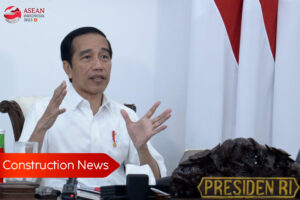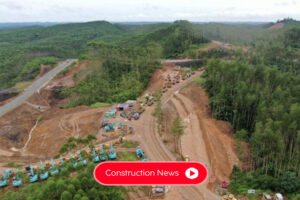Indonesia, as it continues its path of development, places a significant emphasis on infrastructure as a fundamental pillar in its national progress. Recognizing the pivotal role that infrastructure plays in fostering economic growth, the Indonesian government reaffirms its commitment to substantial support through a robust injection of funds from the State Budget (APBN). This commitment is visibly reflected in the allocation of a substantial Rp422.7 trillion in the 2024 APBN dedicated specifically to the infrastructure sector.
President Joko Widodo (Jokowi) remains steadfast in prioritizing the allocation of the State Budget for infrastructure development, evident in the consistent upward trajectory of the budget allocation for this crucial sector.
In the year 2024, President Jokowi is gearing up to deploy the largest-ever infrastructure budget, setting a record high in his decade-long leadership, amounting to an impressive Rp422.7 trillion. This substantial financial commitment is intended to spearhead a variety of priority projects, with the ambitious National Capital region (IKN) undertaking prominently featured.
Finance Minister Sri Mulyani previously articulated that the increased infrastructure budget for 2024 is strategically aligned with essential services, energy and food sectors, connectivity, and information technology. Additionally, the budget will be directed towards land acquisition and State Capital Participation (PMN) for State-Owned Enterprises (BUMN) undergoing restructuring challenges.
Breakdown of the 2024 Infrastructure Budget
The 2024 State Budget aims to propel inclusive and sustainable economic transformation. Indonesia’s progress towards becoming an advanced and prosperous nation is underpinned by various developmental milestones.
In his address during the House of Representatives (DPR) Plenary Session on August 16, President Joko Widodo stressed the need for the 2024 APBN architecture to be responsive to economic dynamics, address challenges, and optimally support development and welfare agendas.
Furthermore, the President emphasized that the 2024 APBN should expedite economic transformation, sustain the momentum of quality, inclusive, and sustainable economic growth, safeguard public purchasing power, and ensure the long-term health and sustainability of the APBN.
The 2024 infrastructure budget has experienced a robust 5.8% growth compared to the 2023 outlook. The allocation comprises Rp213.7 trillion for ministry/agency expenditures, earmarked for implementing regional road plans, IKN development, stadium renovations, and infrastructure in education and health.
In addition, non-ministry/agency expenditures of Rp20.3 trillion will be dedicated to regional infrastructure, Special Allocation Funds (DOB), and Public-Private Partnership (PPP) support. The Regional Transfer Fund (TKD) will receive Rp94.8 trillion, covering physical infrastructure projects and General Allocation Fund (DAU) for public works.
Moreover, financing of Rp93.9 trillion will be provided for State Capital Participation (PMN) in BUMN/Institutions in the infrastructure sector. On the other hand, Sri Mulyani outlined a specific budget of Rp45.7 trillion for National Strategic Projects (PSN) in 2024, focusing primarily on double-tracking railways, irrigation dams, and toll roads.
Continued Momentum: Rp455.8 Trillion APBN for Infrastructure in 2023
The commitment to infrastructure development remains unwavering. In 2023, Sri Mulyani allocated an impressive Rp455.8 trillion from the APBN for infrastructure development.
This realization marks a remarkable 22.2% growth compared to the corresponding period the previous year, amounting to Rp372.8 trillion.
Addressing the curiosity surrounding this substantial budget, Sri Mulyani detailed the allocation of infrastructure funds. This includes the construction of 2,477 flats, 1,104 special houses, and 140,593 self-help houses.
Furthermore, the budget encompasses the development of a water supply management system with a capacity of 1,226 liters/second, the construction of seven new dams, and the extension of 18 existing dams.
The plan also involves constructing 3,455 hectares of new irrigation networks and rehabilitating 74,560 hectares of existing irrigation networks. Additionally, it covers waste management for 12,400 households and waste management for 19,800 households.
The budget will also be used for constructing 377.5 kilometers of new roads, 1,260 meters of flyovers/underpasses, 217.7 kilometers of toll roads, and 5,956 meters of new roads.
It includes the development and expansion of airports at 114 locations, ports at 47 locations, and ferry terminals at 44 locations.
Funding through regional transfers will be allocated for handling 6,260 kilometers of roads and 775 meters of bridges, managing 261,056 water supply units, and constructing water supply networks with a capacity of 7,174 liters/second.
This financing will also cover the installation of 166,253 water supply connections and the construction or maintenance of drainage systems over 9,782 meters.
Other disbursements will be made for the construction of the Trans-Sumatra Toll Road (JTTS) Phase I spanning 972 kilometers and Phase II covering 200 kilometers.
Furthermore, financing will be provided for the development of the Housing Liquidity Facility (FLPP) for 200,000 housing units. This financing will also be allocated to support National Strategic Projects (PSN) by the State Asset Management Agency (LMAN), such as toll roads, ports, dams, railways, and irrigation.
This substantial allocation for infrastructure underscores the government’s unwavering commitment to achieving inclusive and sustainable development, ensuring that the benefits of economic transformation reach all corners of the nation.




 20% off today. Whatsapp us!
20% off today. Whatsapp us!